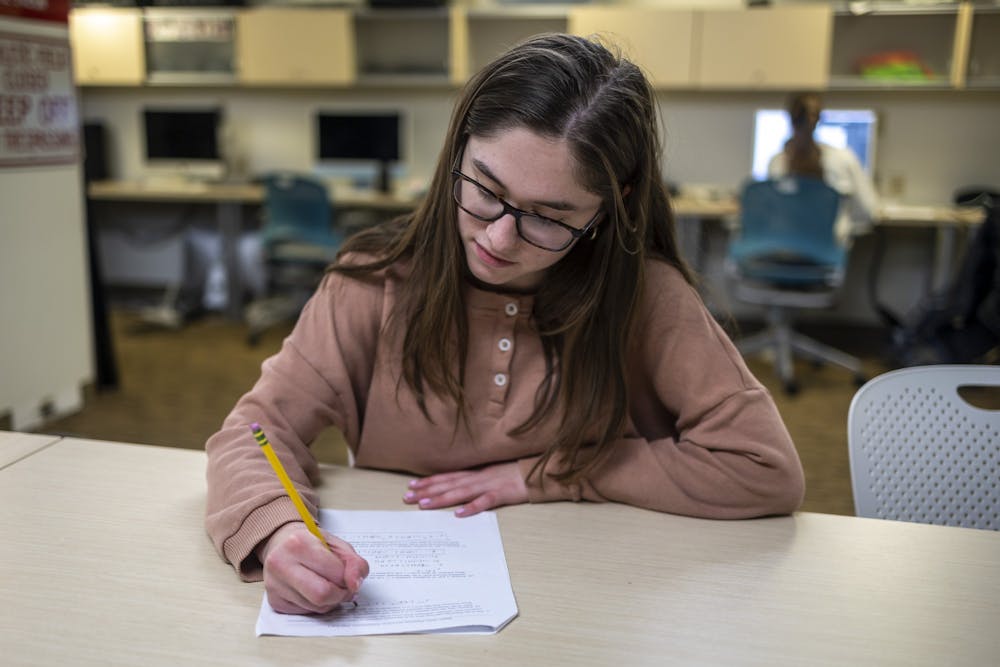Amidst the brunt of the pandemic, many universities decided to waive their SAT and ACT testing requirements. Colleges recognized that access to testing was limited due to outbreaks and adjusted their policies to ensure students were not unfairly disadvantaged by testing cancellations and school closures. Earlier this month, Columbia University and the College of William & Mary announced they are adopting test-optional policies indefinitely. There is growing evidence that these tests are ineffective at properly evaluating applicants, in addition to perpetuating socioeconomic disparities and having a legacy of racism and bias against marginalized communities. The University has been test-optional for the past two years and will be test-optional for an additional two years. To promote a more equitable college admissions process, The Editorial Board calls on the University to extend its test-optional admissions policy indefinitely.
The first SAT was the product of decades of work from psychologist and eugenics supporter Carl C. Brigham, who believed that testing would demonstrate the superiority of the “Nordic race group.” Students first took the SAT in 1926 and Harvard began using the exam in the mid 1930s, with many other schools soon following suit. Administrators saw the test — and others like it — as a systematic way to exclude certain ethnicities from higher education. While today organizations like the College Board may have different intentions from the ones it held decades ago, the legacy of standardized testing raises serious questions about the legitimacy of the practice as a whole.
In light of their problematic history, it may be unsurprising that standardized tests are largely ineffective as tools that are supposed to be critical in gauging a student’s college readiness. In the fall of 2021, the College of William and Mary tracked the academic success of newly enrolled students to uncover any potential differences between the 39 percent of applicants who did not submit test scores and the remaining applicants who did. They found that both groups had similar GPAs and retention rates around 95 percent. Similarly, researchers at the University of Chicago tracked data from over 50,000 students from the Chicago Public School system and found that GPAs are five times stronger than ACT scores at predicting college graduation. These findings underscore the notion that standardized tests do not need to play an important role in the college admissions process.
It is well known that the SAT and ACT are tests in access rather than tests in achievement. Research has proven that students from high-income families tend to earn higher SAT scores than students from low-income families. There are several expensive programs that are dedicated to helping students maximize their scores by helping them recognize patterns in questions and giving them tips that make them better test takers. For example, The Princeton Review and Prep Expert are among the best SAT prep courses currently available to students, and both have programs that will put families out thousands of dollars. Students from lower socioeconomic backgrounds are unable to access these resources that other students can more easily obtain, exacerbating the inequities that are already present in the college admissions process. By committing to test-optional admissions practices, the University can increase access to the University, especially for low-income students who are already at a disadvantage when trying to navigate the daunting application process.
Some may argue that standardized testing serves as an equalizing force, providing colleges with an objective means by which they can compare prospective students. It may be true that factors such as GPA, written essays and letters of recommendation may be harder to interpret than a singular, standardized data point. Nonetheless, deferring to test scores to try and level the playing field essentially ignores the reality that students lack equal access to standardized testing. Though the tests themselves may be administered in the same way to all students, not all students are given the same chance to succeed on these exams. An optional policy means they can still opt to submit scores if they feel their applications are bolstered by them, but students should not feel dissuaded from applying to the University just because they were unable to pay their way to a few extra points on their ACT.
University President Jim Ryan has put forth a 10-year strategic plan to make our school the best public university in the nation. One of the overarching goals outlined in the President’s plan is to cultivate the most vibrant community in higher education. A permanent test-optional admissions policy is an excellent way to make progress towards this goal by increasing access to our institution.
When the current test-optional policy was first implemented in 2021, nearly 41 percent of students applied without testing and over a third of the admissions offers went to students who didn’t submit testing. These trends held in 2022. The University has successfully admitted two classes of students who were given the agency to decide how to best represent their academic preparation — and it just so happens that these classes have been some of the most diverse in the University’s history. Going test-optional is not only the right thing to do, it is a necessary step on our journey to becoming the nation’s gold standard in public education.
The Cavalier Daily Editorial Board is composed of the Executive Editor, the Editor-in-Chief, the two Opinion Editors, their Senior Associates and an Opinion Columnist. The board can be reached at eb@cavalierdaily.com.







